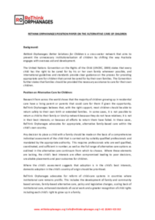Displaying 711 - 713 of 713
The present quantitative study of adolescents in orphanages in South Korea explored the following questions: (1) Do adolescents in institutions experience cognitions and feelings about birth parent loss? (2) What is the association between birth parent loss and mental health (depression, trauma), behavior problems (YSR total internalizing, externalizing), and school problems (school engagement, grades)?
This position paper from ReThink Orphanages explains ReThink's position on the alternative care of children and what are the most favorable forms of alternative care, in the best interests of children.
Friends International, with support from UNICEF, has launched its “Think Before Visiting” campaign. The campaign is aimed at partnering with tourists to end “orphanage tourism” in Cambodia.


